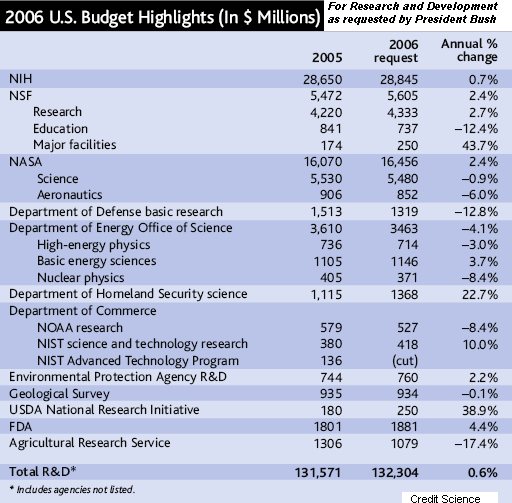|
News & Views item - February 2005 |
![]() Squeezed
Between the US' Costly Adventure in Iraq and Multi Billion Dollar Tax Cuts US
Science Looks Toward Leaner Times. (February 11, 2005)
Squeezed
Between the US' Costly Adventure in Iraq and Multi Billion Dollar Tax Cuts US
Science Looks Toward Leaner Times. (February 11, 2005)
The table below sets out President George W Bush's science budget request for 2006. It's now the turn of the US House of Representatives and Senate to introduce their modifications. How will such programs as the International Space Station and the proposed manned missions to the Moon and Mars fair? And will a rescue mission for the Hubble Space Telescope be reinstated? The President made no request for funding it.

Within the NSF budget while major infrastructure grants increase by US$76 million, funds for education are reduced by US$104 million. Science reports, "The biggest blow would fall on the directorate's division of elementary, secondary, and informal education. A $60 million program begun last year to help teachers, from training them to providing professional development, would be slashed by nearly half, to $33 million." There was a sizeable cut to the NSF's overall educational budget between 2004 and 2005. If the 2006 cut goes through, the NSF estimates its educational programs will reach 64,000 elementary and secondary school students and teachers in 2006, compared with 100,000 in 2004.
Basic research funded by the DoD takes another big hit, down by US$194 million. Overall the budget for science is increased 0.6%, significantly below inflation.
And to return to space science just as the U.S.-European mission to Saturn and its moon Titan is gathering remarkable data sets, President Bush proposes a budget that could wipe NASA's only major mission planned for the outer solar system, wipe an earth science flight to study terrestrial aerosols, and significantly delay other longer-term projects, from planet finders to dark-energy seekers. But let's hear it for the ISS, and manned Moon and Mars shots.